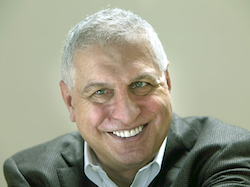 Errol Morris, before he became the renowned director and author he is today, was a private detective.
Errol Morris, before he became the renowned director and author he is today, was a private detective.
In a talk last night at Harvard’s Graduate School of Design, Morris discussed how that job’s fundamental spirit of inquiry has informed his documentaries, among them Gates of Heaven, The Thin Blue Line, The Fog of War, Standard Operating Procedure, and Tabloid. “I only discovered very late in the game that I was a journalist,” he said. But his work has always been, on some level, journalistic. And academic.
As he joked: “A detective is just a paid epistemologist.”
Morris is also an inventor, his most famous creation being the Interrotron (named by his wife, he said, who appreciated the name’s apt marriage of the words “interview” and “terror”). And Morris, fittingly, spent much of his talk — one punctuated and illustrated by clips he’d selected from some of his most celebrated documentaries — discussing the journalistic work his invention facilitates: interviewing subjects and sources.
What he’s most interested in when he conducts those interviews, he said, is a kind of journalistic version of mens rea: literally, and in the legal sense, “a guilty mind.” In Morris’ sense, mens rea isn’t necessarily about guilt, legal or moral or any other kind; it’s about appending the why of a person’s action to the action itself. And about doing so on an individual, personal level. This is the thread that has animated and connected his documentaries, which have specialized in both upending received wisdom and finding the humanity behind it. And it’s the question that has connected Morris, the investigator, to his sources. “What were they thinking?”
Answering that question requires, above all, “a willingness to listen,” Morris said. Obvious, yes, but also often forgotten — particularly in the documentary context, where directors are often, implicitly, actors in the work they produce. Though interviewers often ask their sources questions to which they already know the answers, he noted, it’s far more productive that they be guided by true curiosity, by a true desire to learn something new. “An interview,” Morris said, “really should be a surprise, an excursion into unexpected terrain.”
Because of that, “I can’t interview someone if I don’t like them,” Morris noted. Skepticism is key, of course — “I think skepticism is truly such a wonderful thing,” he said — but respect has to be there, as well. His conversation with Robert McNamara, for example, for The Fog of War — an interview notable and somewhat shocking for its candor and humanity — benefitted from a telling mix of empathy and epistemology. “I’m not a Catholic priest; I don’t want to hear his confession,” Morris said. “I’m far more interested in hearing his story than in passing judgment.”
And withholding judgment, in its way, empowers curiosity, allowing new doors to be opened and new perspectives to be seen. It allows Morris — the filmmaker, the interrogator, the journalist — to take nothing for granted. As he put it: “Nothing is so obvious that it’s obvious.”
Image by Nubar Alexanian used under a GNU Free Documentation License.